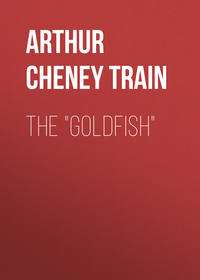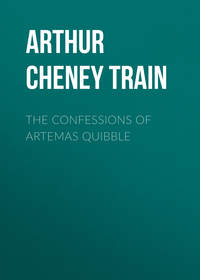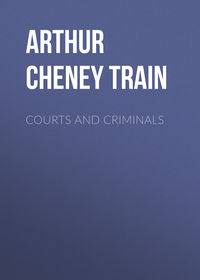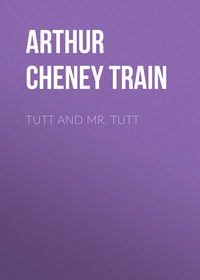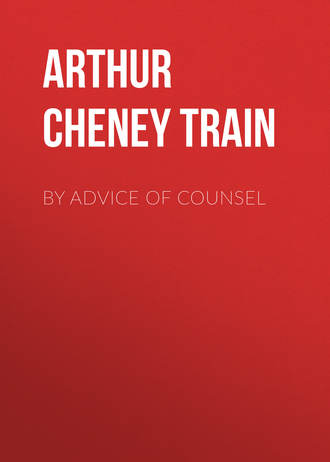 полная версия
полная версияBy Advice of Counsel
"What is your name?" asked the lawyer dramatically.
"My name is Oswald Garrison Smithers," replied the reverend gentleman in Canton-flannel accents, "and I reside in Pantuck, Iowa, where I am pastor of the Reformed Lutheran Church."
"Do you know the defendant?"
"Indeed I do," sighed the Reverend Smithers. "I remember him very well. I solemnized his marriage to a widow of my congregation on July 4, 1917; in fact to the relict of our late senior warden, Deacon Pellatiah Higgins. Sarah Maria Higgins was the lady's name, and she is alive and well at the present time."
He gazed deprecatingly at the jury. If meekness had efficacy he would have inherited the earth.
"What?" ejaculated the foreman. "You say this man is married to three women?"
"Trigamy—not bigamy!" muttered the clerk, sotto voce.
"You have put your finger upon the precise point, Mister Foreman!" exclaimed Mr. Tutt admiringly. "If Mr. Higgleby was already lawfully married to a lady in Iowa when he married Miss—or Mrs.—Startup in Chicago last May, his marriage to the latter was not a legal marriage; it was in fact no marriage at all. You can't charge a man with bigamy unless you recite a legal marriage followed by an illegal one. Therefore, since the indictment fails to set forth a legal marriage anywhere followed by a marriage, legal or otherwise, in New York County, it recites no crime, and my client must be acquitted. Is not that the law, Your Honor?"
Judge Russell quickly hid a smile and turned to the moribund Caput.
"Mr. Magnus, have you anything to say in reply to Mr. Tutt's argument?" he asked. "If not—"
But no response came from Caput Magnus. He was past all hearing, understanding or answering. He was ready to be carried out and buried.
"Well, all I have got to say is—" began the foreman disgustedly.
"You do not have to say anything!" admonished the judge severely. "I will do whatever talking is necessary. A little more care in the preparation of the indictment might have rendered this rather absurd situation impossible. As it is, I must direct an acquittal. The defendant is discharged upon this indictment. But I will hold him in bail for the action of another grand jury."
"In which event we shall have another equally good defense, Your Honor," Mr. Tutt assured him.
"I don't doubt it, Mr. Tutt," returned the judge good-naturedly. "Your client seems to have loved not wisely but too well." And they all poured out happily into the corridor—that is, all of them except Caput and the two ladies, who remained seated upon their bench gazing fiercely and disdainfully at each other like two tabby cats on a fence.
"So you're not married to him, either!" sneered Miss Woodcock.
"Well, I'm as much married to him as you are!" retorted Miss Startup with her nose in the air.
Then instinctively they both turned and with one accord looked malevolently at Caput, who, seeing in their glance something which he did not like, slipped stealthily from his chair and out of the room, leaving ignominiously behind him upon the floor his precious volume entitled "How to Try a Case"!
"That Sort of Woman"
"Judge not according to the appearance."—John VII: 24.
"Tutt," said Mr. Tutt, entering the offices of Tutt & Tutt and hanging his antediluvian stovepipe on the hat-tree in the corner, "I see by the morning paper that Payson Clifford has departed this life."
"You don't say!" replied the junior Tutt, glancing up from the letter he was writing. "Which one,—Payson, Senior, or Payson, Junior?"
"Payson, Senior," answered Mr. Tutt as he snipped off the end of a stogy with the pair of nail scissors which he always carried in his vest pocket.
"In that case, it's too bad," remarked Tutt regretfully.
"Why 'in that case'?" queried his partner.
"Oh, the son isn't so much of a much!" replied the smaller Tutt. "I don't say the father was so much of a much, either. Payson Clifford was a good fellow—even if he wasn't our First Citizen—or likely to be a candidate for that position in the Hereafter. But that boy—"
"Shh!" reproved Mr. Tutt, slowly shaking his head so that the smoke from his rat-tailed cigar wove a gray scroll in the air before his face. "Remember that there's one thing worse than to speak ill of the dead, and that's to speak ill of a client!"
Mr. Payson Clifford, the client in question, was a commonplace young man who had been carefully prepared for the changes and chances of this mortal life first at a Fifth Avenue day school in New York City, afterwards at a select boarding school among the rock-ribbed hills of the Granite State, and finally at Cambridge, Massachusetts, in the cultured atmosphere of Harvard College, through whose precincts, in the dim, almost forgotten past, we are urged to believe that the good and the great trod musingly in their beautiful prime. He emerged with a perhaps almost prudish distaste for the ugly, the vulgar, and the unclean,—and with distinct delusions of grandeur. He was still in that state not badly described by the old saw—"You can always tell a Harvard man,—but you can't tell him much."
His mother had died when he was still a child and he preserved her memory as the most sacred treasure of his inner shrine. He could just recall her as a gentle and dignified presence, in contrast with whom his burly, loud-voiced father had always seemed crass and ordinary. And although it was that same father who had, for as long as he could remember, supplied him with a substantial check upon the first day of every month and thus enabled him to achieve that exalted state of intellectual and spiritual superiority which he had in fact attained, nevertheless, putting it frankly in the vernacular, Payson rather looked down on the old man, who palpably suffered from lack of the advantages which he had furnished to his son.
Payson, Sr., had never taken any particular pains to alter his son's opinion of himself. On the whole he was more proud of him than otherwise, recognizing that while he obviously suffered from an overdevelopment of the ego and an excessive fastidiousness in dress, he was, at bottom, clearly all right and a good sort. Still, he was forced to confess that there wasn't much between them. His son expressed the same thought by regretting that his father "did not speak his language."
So, in the winter vacation when Payson, Sr., fagged from his long day at the office sought the "Frolics" or the "Folies," Payson, Jr., might be seen at a concert for the harpsichord and viola, or at an evening of Palestrina or the Earlier Gregorian Chants. Had he been less supercilious about it this story would never have been written—and doubtless no great loss at that. But it is the prerogative of youth to be arrogantly merciless in its judgment of the old. Its bright lexicon has no verdict "with mitigating circumstances." Youth is just when it is right; it is cruel when it is wrong; and it is inexorable in any case. If we are ever to be tried for our crimes let us have juries of white whiskered old boys who like tobacco, crab flakes, light wines and musical comedy.
All of which leads up to the sad admission upon our part that Payson, Jr., was a prig. And in the very middle of his son's priggishness Payson, Sr., up and died, and Tutt and Mr. Tutt were called upon to administer his estate.
There may be concealed somewhere a few rare human beings who can look back upon their treatment of their parents with honest satisfaction. I have never met any. It is the fate of those who bring others into the world to be chided for their manners, abused for their mistakes, and pilloried for their faults. Twenty years difference in age turns many an elegance into a barbarism; many a virtue into a vice-versa. I do not perform at breakfast for the edification of my offspring upon the mustache cup, but I chew my strawberry seeds, which they claim is worse. My grandpapa and grandmama used to pour the coffee from their cups and drink it from their saucers and they were—nevertheless—rated AA1 in Boston's Back Bay Blue Book. And now my daughters, who smoke cigarettes, object loudly to my pipe smoke! Autre temps autres manières. And no man is a hero to his children. He has a hanged-sight more chance with his valet—if in these days he can afford to keep one.
His father's death was a shock to Payson, Jr., because he had not supposed that people in active business like that ever did die,—they "retired" instead, and after a discreet period of semi-seclusion gradually disintegrated by appropriate stages. But Payson, Sr., simply died right in the middle of everything—without any chance of a spiritual understanding—"reconciliation" would be inaccurate—with his son. So, Payson, Jr., protestingly acquired by part cash and balance credit a complete suit of what he scathingly described as "the barbarous panoply of death" and, turning himself into what he similarly called a "human catafalque," followed Payson, Sr., to the grave.
Perhaps, after all, we have been a bit hard on Payson, Jr. He was fundamentally, as his father had perceived, good stuff, and wanted to do the right thing. But what is the right thing? Really it isn't half as hard to be good as to know how.
As the orphaned Payson, ensconced in lonely state in one of the funeral hacks, was carried at a fast trot down Broadway towards the offices of Tutt & Tutt, he consoled himself for his loss with the reflection that this was, probably, the last time he would ever have to see any of his relatives. Never in his short life had he been face to face with such a gathering of unattractive human beings. He hadn't imagined that such people existed. They oughtn't to exist. The earth should be a lovely place, its real estate occupied only by cultured and lovely people. These aesthetic considerations reminded him with a shock that, just as he had been an utter stranger to them, so he had been a stranger to his father—his poor, old, widowed father. What did he really know about him?—not one thing! And he had never tried to find out anything about him,—about his friends, his thoughts, his manner of life,—content merely to cash his checks, under the unconscious assumption that the man who drew them ought to be equally content to be the father of such a youth as himself. But those rusty relatives! They must have been his father's! Certainly his mother's wouldn't have been like that,—and he felt confident he took after his mother. Still, those relatives worried him! Up at Harvard he had stood rather grandly on his name—"Payson Clifford, Jr.,"—with no questions asked about the "Senior" or anybody else. He now perceived that he was to be thrown out into the world of fact where who and what his father had been might make a lot of difference. Rather anxiously he hoped the old gentleman would turn out to have been all right;—and would have left enough of an estate so that he could still go on cashing checks upon the first day of every month!
It was one of the unwritten laws of the office of Tutt & Tutt that Mr. Tutt was never to be bothered about the details of a probate matter, and it is more than doubtful whether, even if he had tried, he could have correctly made out the inventory of an estate for filing in the Surrogate's Court. For be it known that, while the senior member of the firm was long on the philosophy of the law and the subtleties of "restraints on alienation," "powers," "perpetuities" and the mysteries of "the next eventual estate," he was frankly short on the patience to add and subtract. So while Mr. Tutt drew their clients' wills, it was Tutt who attempted to probate and execute them. Then, if by any chance, there was any trouble or some ungrateful relative thought he hadn't got enough, it was Mr. Tutt who reluctantly tossed away his stogy, strolled over to court and defended the will which he had drawn,—usually with success.
So it was the lesser Tutt who wrung the hand of Payson Clifford and gave him the leathern armchair by the window.
"And now about the will!" chirped Tutt, as after a labored encomium upon the virtues of Payson, Senior, deceased, he took the liberty of lighting a cigarette before he commenced to read the instrument which lay in a brown envelope upon the desk before him. "And now about the will! I suppose you are already aware that your father has made you his executor and, after a few minor legacies, the residuary legatee of his entire estate?"
Payson shook his head mutely. He felt it more becoming to pretend to be ignorant of these things under the circumstances.
"Yes," continued Tutt cheerfully, taking up the envelope, "Mr. Tutt drew the will—nearly fifteen years ago—and your father never thought necessary to change it. It's lain right there in our 'Will Box' without being disturbed more than once,—and that was seven or eight years ago when he came in one day and asked to be allowed to look at it,—I think he put an envelope containing a letter in with it. I found one there the other day."
Payson languidly took the will in his hand.
"How large an estate did he leave?" he inquired.
"As near as I can figure out about seventy thousand dollars," answered Tutt. "But the transfer tax will not be heavy, and the legacies do not aggregate more than ten thousand."
The instrument was a short one,—drawn with all Mr. Tutt's ability for compression—and filling only a single sheet. Payson's father had bequeathed seventy-six hundred dollars to his three cousins and their children, and everything else he had left to his son. Payson rapidly computed that after settling the bills against the estate, including that of Tutt & Tutt, he would probably get at least sixty thousand out of it. At the current rate he would continue to be quite comfortable,—more so in fact than heretofore. Still, it was less than he had expected. Perhaps his father had had expensive habits.
"Here's the letter," went on Tutt, handing it to Payson who took out his pen-knife to open it the more neatly. "Probably a suggestion as to the disposal of personal effects—remembrances or something of the sort. It's often done."
The envelope was a cheap one, ornamented in the upper left hand corner with a wood cut showing a stout goddess in a night dress, evidently meant for Proserpina—pouring a Niagara of grain out of a cornucopia of plenty over a farmland stacked high with apples, corn, and pumpkins, and flooded by the beams of a rising sun with a real face. Beneath were the words:
"If not delivered in five days return to
Clifford, Cobb & Weng,
Grain Dealers and Produce
597 Water Street,
N.Y. City,
N.Y."
Even as his eye fell upon it Payson was conscious of its coarse vulgarity. And "Weng"! Whoever heard of such a name? He certainly had not,—hadn't even known that his father had a partner with such an absurd cognomen! "—& Weng!" There was something terribly plebeian about it. As well as about the obvious desire for symmetry which had led to the addition of that superfluous "N.Y." below the entirely adequate "N.Y. City." But, of course, he'd be glad to do anything his father requested in a letter.
He forced the edge of the blade through the tough fiber of the envelope, drew forth the enclosed sheet and unfolded it. In the middle of the top was a replica of the wood cut upon the outside, only minus the "If not delivered in five days return to." Then Payson read in his father's customary bold scrawl the simple inscription, doomed to haunt him sleeping and waking for many moons:—
"In case of my sudden death I wish my executor to give twenty-five thousand dollars to my very dear friend Sadie Burch, of Hoboken, N.J.
"PAYSON CLIFFORD."
For a brief—very brief—moment, a mist gathered over the letter in the son's hand. "My dear friend Sadie Burch!" He choked back the exclamation of surprise that rose unconsciously to his lips and endeavored to suppress any facial evidence of his inner feelings. "Twenty-five thousand!" Then he held out the letter more or less casually to Tutt.
"Wee-e-ll!" whistled the lawyer softly, with a quick glance from under his eyebrows.
"Oh, it isn't the money!" remarked Payson in a sickly tone—although of course he was lying. It was the money.
The idea of surrendering nearly half his father's estate to a stranger staggered him; yet to his eternal credit, in that first instant of bewildered agony no thought of disregarding his father's wishes entered his mind. It was a hard wallop, but he'd got to stand it.
"Oh, that's nothing!" remarked Tutt. "It's not binding. You don't need to pay any attention to it."
"Do you really mean that that paper hasn't any legal effect?" exclaimed the boy with such a reaction of relief that for the moment the ethical aspect of the case was entirely obscured by the legal.
"None whatever!" returned Tutt definitely.
"But it's part of the will!" protested Payson. "It's in my father's own handwriting."
"That doesn't make any difference," declared the lawyer. "Not being witnessed in the manner required by law it's not of the slightest significance."
"Not even if it is put right in with the will?"
"Not a particle."
"But I've often heard of letters being put with wills."
"No doubt. But I'll wager you never heard of any one of them being probated."
Payson's legal experience in fact did not reach to this technical point.
"Look here!" he returned obstinately. "I'll be hanged if I understand. You say this paper has no legal value and yet it is in my father's own hand and practically attached to his will. Now, apart from any—er—moral question involved, just why isn't this letter binding on me?"
Tutt smiled leniently.
"Have a cigarette?" he asked, and when Payson took one, he added sympathetically as he held a match for him, "Your attitude, my dear sir, does you credit. It is wholly right and natural that you should instinctively desire to uphold that which on its face appears to be a wish of your father. But all the same that letter isn't worth the paper it's written on—as matter of law."
"But why not?" demanded Payson. "What better evidence could the courts desire of the wishes of a testator than such a letter?"
"The reason is simple enough!" replied Tutt, settling himself in a comfortable position. "In the eye of the law no property is ever without an owner. It is always owned by somebody, although the ownership may be in dispute. When a man dies his real property instantly passes to his heirs and his personal property descends in accordance to the local statute of distributions or, if there isn't any, to his next of kin; but if he leaves a will, to the extent to which it is valid, it diverts the property from its natural legal destination. Thus, in effect, the real purpose of a will is to prevent the laws operating on one's estate after death. If your father had died intestate, you would have instantly become, in contemplation of law, the owner of all his property. His will—his legal will—deprives you of a small part of it for the benefit of others. But the law is exceedingly careful about recognizing such an intention of a testator to prevent the operation of the statutes and requires him to demonstrate the sincerity and fixity of that intention by going through various established formalities, such as putting his intention in due form in a written instrument which he must sign and declare to be his last will before a certain number of competent witnesses whom he requests to sign as such and who actually do sign as such in his presence and in the presence of each other. Your father obviously did none of these things when he placed this letter with his will."
"But isn't a letter ever enough—under any circumstances?" inquired Payson.
"Well," said Tutt. "It is true that under certain exceptional circumstances a man may make what is known as a nuncupative will."
"What is a—a—nuncupative will?" asked his client.
"Technically it is an oral will, operating on personality only, made in extremis—that is, actually in fear of death—and under our statutes limited to soldiers in active military service or to mariners at sea. Under the old common law it was just as effective to pass personal estate as a written instrument."
"But father wasn't either a soldier or a sailor," commented Payson, "and anyhow a letter isn't an oral will; if it's anything at all, it's a written one, isn't it?"
"That is the attitude the law takes," nodded Tutt. "Of course, one could argue that it made no difference whether a man uttered his wishes orally in the presence of witnesses or reduced them to writing and signed them, but the law is very technical in such matters and it has been held that a will reduced to writing and signed by the testator, or a memorandum of instructions for making a will, cannot be treated as a nuncupative will; nor is a written will, drawn up by an attorney, but not signed, owing to the sickness of the testator to be treated as a nuncupative will; but upon requisite proof—in a proper case—a paper, not perfected as a written will, may be established as a nuncupative will when its completion is prevented by act of God, or any other cause than an intention to abandon or postpone its consummation. The presumption of the law is against validity of a testamentary paper not completed. There must be in the testator the animus testandi, which is sometimes presumed from circumstances in such cases and in such places as nuncupative wills are recognized. Now, your father being as you point out, neither a soldier nor a sailor, couldn't have made a nuncupative will under any circumstances, even if a letter would legally be treated as such a will instead of as an ineffectual attempt to make a written one—upon which point I confess myself ignorant. Therefore"—and he tossed away his cigarette butt with an air of finality—"this letter bequeathing twenty-five thousand dollars to Sadie Burch—whoever and whatever she may be—is either an attempt to make a will or a codicil to a will in a way not recognized by the statute, or it is an attempt to add to, alter or vary a will already properly executed and witnessed by arbitrarily affixing to or placing within it an extraneous written paper."
"Well," commented Payson, "I understand what you've said about nun—nuncupative wills, all right,—that is, I think I do. But leaving them out of consideration I still don't see why this letter can't be regarded as part of the original will."
"For the reason that when your father executed the original document he went through every form required by the statute for making a will. If he hadn't, it wouldn't have been a will at all. If this paper, which never was witnessed by a single person, could be treated as a supplement or addition to the will, there would have been no use requiring the original will to be witnessed, either."
"That seems logical," agreed Payson. "But isn't it often customary to incorporate other papers by referring to them in a will?"
"It is sometimes done, and usually results in nothing but litigation. You see for yourself how absurd it would be to treat a paper drawn or executed after a will was made as part of it, for that would render the requirements of the statute nugatory."
"But suppose the letter was already in existence or was written at the same time as the will,—wouldn't that make a difference?" hesitated Payson.
"Not a bit! Not one bit!" chirped Tutt. "The law is settled that such a paper writing can be given effect only under certain very special conditions and only to a limited extent. Anyhow that question doesn't arise here."
"Why not?" queried the residuary legatee. "How do you know this letter wasn't written and placed inside the will when it was made?—And that my father supposed that of course it would be given effect?"
"In that case why shouldn't he have incorporated the legacy in the will?" countered Tutt sharply.
"He—er—may not have wished Mr. Tutt to know about it," murmured Payson, dropping his eyes.
"Oh,—hardly!" protested Tutt. "We can be morally certain that this letter was written and placed with the will that time your father came in here and asked to be allowed to see it, seven odd years ago. Mr. Tutt would have noticed it if your father had placed it with the will in the first instance and would have warned him that nothing of the sort could possibly be effective."
"But," insisted Payson, "assuming for argument's sake that this letter was in fact written at the time the will was originally executed, what is the reason the law won't recognize it as a valid bequest?"


